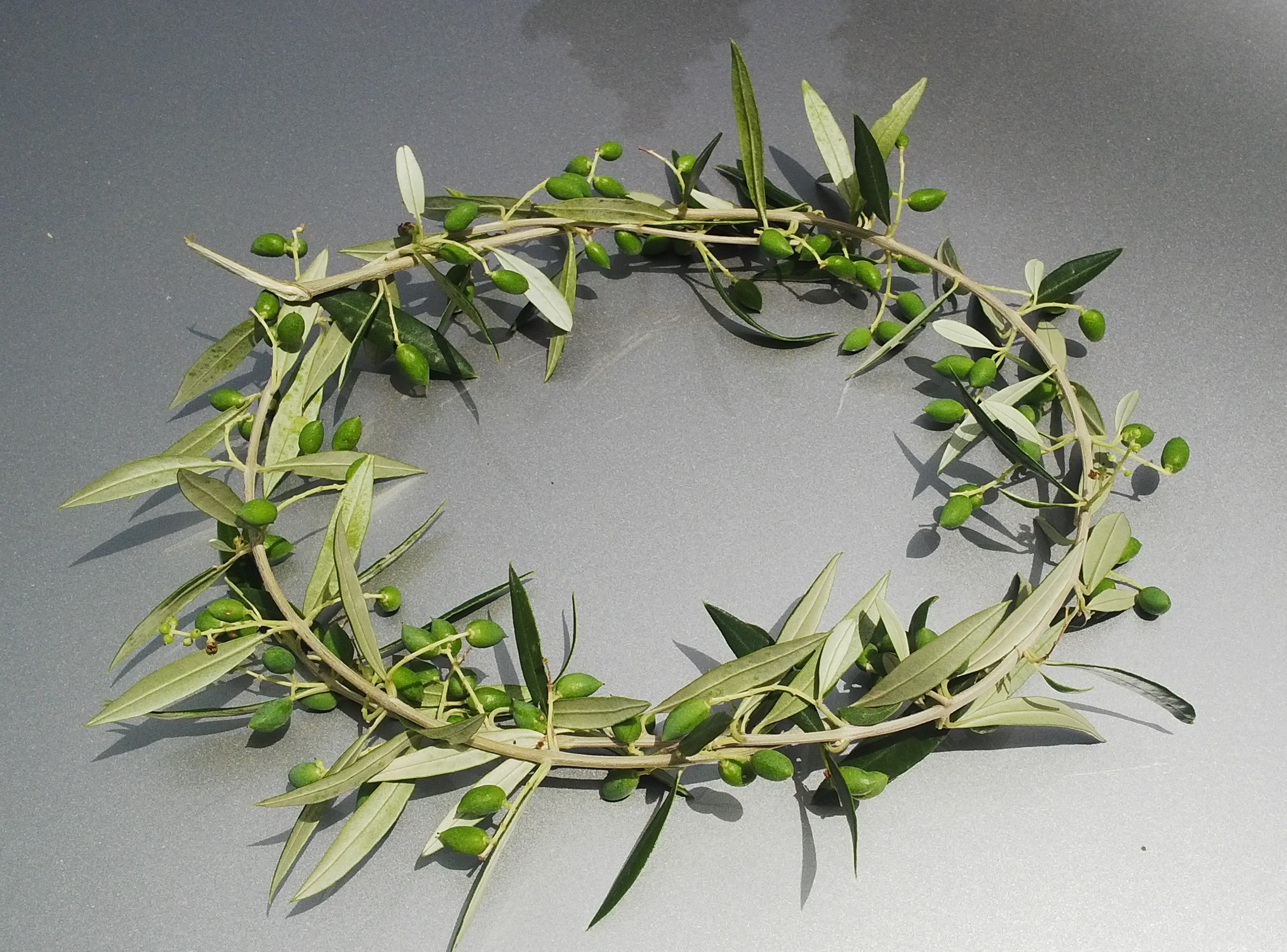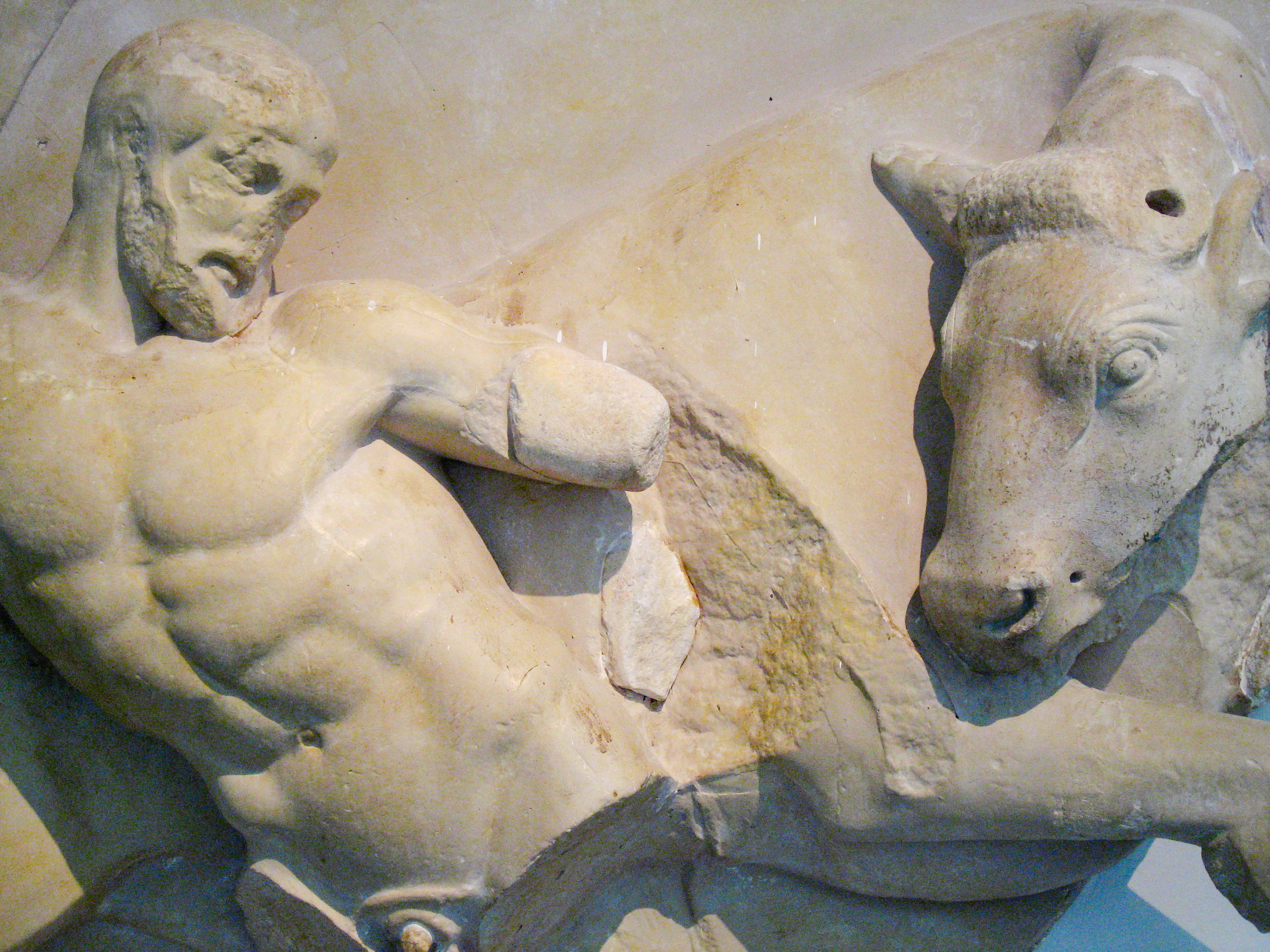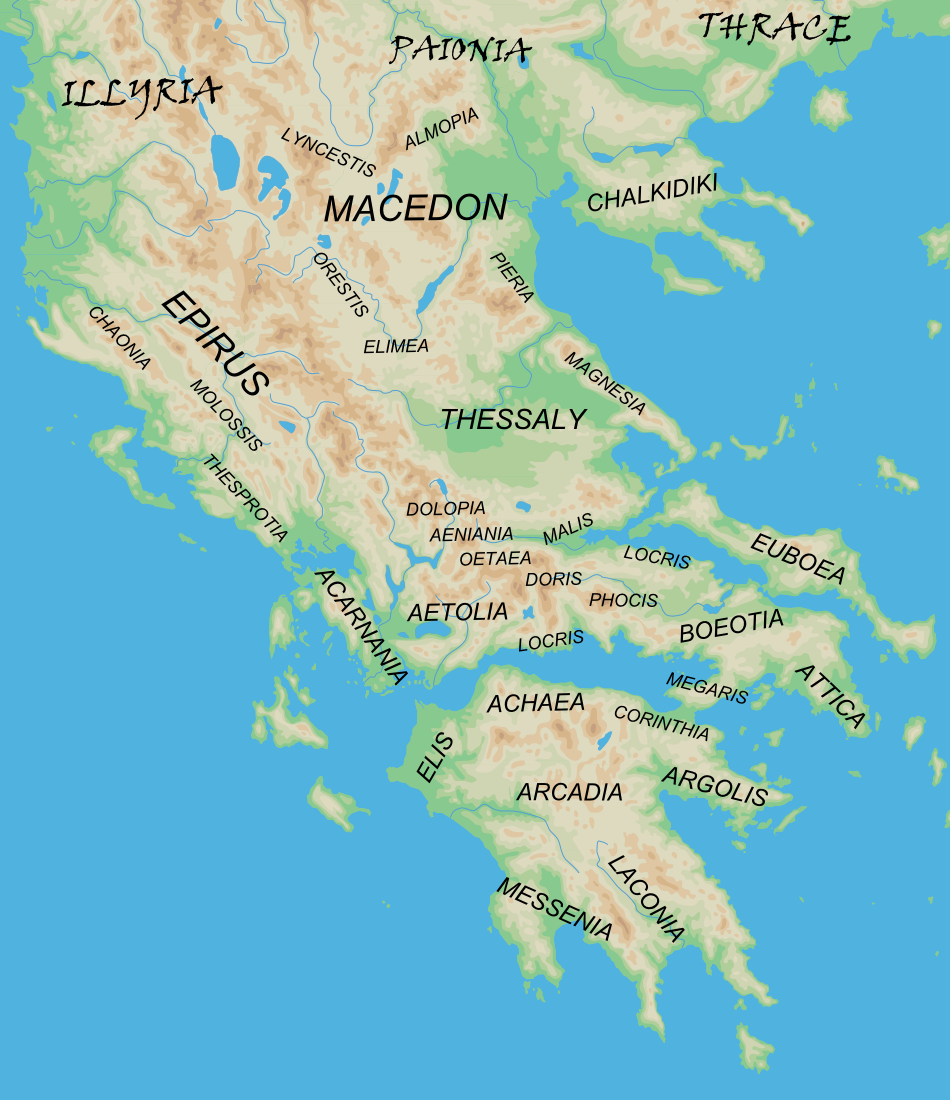|
Olive Wreath
The olive wreath, also known as ''kotinos'' (), was the prize for the winner at the ancient Olympic Games. It was a olive branch, branch of the Olea oleaster, wild olive tree ''Elaia Kallistephanos'' that grew at Olympia, Greece, Olympia, intertwined to form a circle or a horse-shoe. The branches of the sacred wild-olive tree near the temple of Zeus were cut by a ''pais amphithales'' (, a boy whose parents were both alive) with a pair of golden scissors. Then he took them to the temple of Hera and placed them on a gold-ivory table. From there, the Hellanodikai (the judges of the Olympic Games) would take them, make the wreaths and crown the winners of the Games. History According to Pausanias (geographer), Pausanias it was introduced by Heracles as a prize for the Stadion (running race), running race winner to honor his father Zeus. In the ancient Olympic Games there were no gold medal#Olympic Games, gold, silver, or bronze medals. There was only one winner per event, crowned wi ... [...More Info...] [...Related Items...] OR: [Wikipedia] [Google] [Baidu] |
Temple Of Zeus, Olympia
The Temple of Zeus was an ancient Greek temple in Olympia, Greece, dedicated to the god Zeus. The temple, built in the second quarter of the fifth century BC, was the very model of the fully developed classical Greek temple of the Doric order.bTemple of Zeusat Archaeopaedia, Stanford University Construction The Temple of Zeus was built on an already ancient religious site at Olympia. The Altis, an enclosure with a sacred grove, open-air altars and the tumulus of Pelops, was first formed during the tenth and ninth centuries BC. The temple was constructed between and 456 BC. The temple was of peripteral form with a frontal pronaos (porch), mirrored by a similar arrangement at the back of the building, the opisthodomos. The building sat on a crepidoma (platform) of three unequal steps, the exterior columns were positioned in a sixbythirteen arrangement, two rows of seven columns divided the cella (inner chamber) into three aisles. An echo of the temple's original appearance ... [...More Info...] [...Related Items...] OR: [Wikipedia] [Google] [Baidu] |
Plutus (play)
''Plutus'' (, ''Ploutos'', "Wealth") is an Ancient Greek comedy by the playwright Aristophanes, which was first produced in 388 BC. A political satire on contemporary Athens, it features the personified god of wealth Plutus. Reflecting the development of Old Comedy towards New Comedy, it uses such familiar character types as the stupid master and the insubordinate slave to attack the morals of the time. Plot The play features an elderly Athenian citizen, Chremylos, and his slave Cario or Carion. Chremylos presents himself and his family as virtuous but poor, and has accordingly gone to seek advice from an oracle. The play begins as he returns to Athens from Delphi, having been instructed by Apollo to follow the first man he meets and persuade him to come home with him. That man turns out to be the god Plutus — who is, contrary to all expectations, a blind beggar. After much argument, Plutus is convinced to enter Chremylos's house, where he will have his vision restored ... [...More Info...] [...Related Items...] OR: [Wikipedia] [Google] [Baidu] |
Aristophanes
Aristophanes (; ; ) was an Ancient Greece, Ancient Greek Ancient Greek comedy, comic playwright from Classical Athens, Athens. He wrote in total forty plays, of which eleven survive virtually complete today. The majority of his surviving plays belong to the genre of comic drama known as Old Comedy and are considered its most valuable examples. Aristophanes' plays were performed at the religious festivals of Athens, mostly the City Dionysia and the Lenaia, and several of them won the first prize in their respective competitions. Also known as "The Father of Comedy" and "the Prince of Ancient Comedy", Aristophanes wrote plays that often dealt with real-life figures, including Euripides and Alcibiades, and contemporary events, such as the Peloponnesian War. He has been said to recreate the life of ancient Athens more convincingly than any other author. His plays are characterized by preposterous premises, explicit language, wordplays, and political satire. His powers of ridicule ... [...More Info...] [...Related Items...] OR: [Wikipedia] [Google] [Baidu] |
Virtue
A virtue () is a trait of excellence, including traits that may be morality, moral, social, or intellectual. The cultivation and refinement of virtue is held to be the "good of humanity" and thus is Value (ethics), valued as an Telos, end purpose of life or a foundational principle of being. In human practical ethics, a virtue is a disposition to choose actions that succeed in showing high moral standards: doing what is said to be right and avoiding what is wrong in a given field of endeavour, even when doing so may be unnecessary from a utilitarianism, utilitarian perspective. When someone takes pleasure in doing what is right, even when it is difficult or initially unpleasant, they can establish virtue as a habit. Such a person is said to be virtuous through having cultivated such a disposition. The opposite of virtue is vice. Other examples of this notion include the concept of Merit (Buddhism), merit in Asian traditions as well as (Chinese language, Chinese ). Etymology The ... [...More Info...] [...Related Items...] OR: [Wikipedia] [Google] [Baidu] |
Mardonius (general)
Mardonius ( ; ; died 479 BC) was a Persian military commander during the Greco-Persian Wars. Though he secured initial victories in the first Persian invasion of Greece, he was ultimately forced to retreat into Anatolia after suffering catastrophic losses in both men and material due to a storm off the coast of Mount Athos, following which he was relieved of his command by Darius the Great. He was later re-appointed by Xerxes I and took part in the second Persian invasion of Greece. In 480 and 479 BC, Mardonius spearheaded the Persian army's destruction of Athens. Shortly thereafter, he was killed during the Battle of Plataea. Early and personal life Mardonius was the son of Gobryas, a Persian nobleman who had assisted the Achaemenid prince Darius when he claimed the throne. The alliance between the new king and his friend was cemented by diplomatic marriages: Darius married Gobryas' daughter, and Gobryas married Darius' sister. Furthermore, Mardonius married Darius' daug ... [...More Info...] [...Related Items...] OR: [Wikipedia] [Google] [Baidu] |
Tigranes
Tigranes (, ) is the Greek rendering of the Old Iranian name ''*Tigrāna''. This was the name of a number of historical figures, primarily kings of Armenia. The name of Tigranes, which was theophoric in nature, was uncommon during the Achaemenid era (550–330 BC). Only two historical figures are known to bear the name during that period. By far the best known Tigranes is Tigranes the Great, king of Armenia from 95 to 55 BC, who founded a short-lived Armenian empire. His father, who ruled from 115 to 95 BC, was also named Tigranes, as were several later kings of Armenia. There is some lack of consistency in assigning dynastic numbers to these kings. The earliest Tigranes and his son are usually not included, making Tigranes I the father of Tigranes the Great. Another Tigranes was a member of the Achaemenid family who, according to Herodotus, was a son of Artabanus who commanded the Medes in the army of Xerxes during the invasion of Greece. The satirist Lucian, in his T ... [...More Info...] [...Related Items...] OR: [Wikipedia] [Google] [Baidu] |
Battle Of Thermopylae
The Battle of Thermopylae ( ) was fought in 480 BC between the Achaemenid Empire, Achaemenid Persian Empire under Xerxes I and an alliance of Polis, Greek city-states led by Sparta under Leonidas I. Lasting over the course of three days, it was one of the most prominent battles of both the second Persian invasion of Greece and the wider Graeco-Persian Wars. The engagement at Thermopylae occurred simultaneously with the naval Battle of Artemisium: between July and September during 480 BC. The second Persians, Persian invasion under Xerxes I was a delayed response to the failure of the first Persian invasion of Greece, first Persian invasion, which had been initiated by Darius the Great, Darius I and ended in 490 BC by an Classical Athens, Athenian-led Ancient Greece, Greek victory at the Battle of Marathon. By 480 BC, a decade after the Persian defeat at Marathon, Greece, Marathon, Xerxes had amassed a massive land and naval force, and subsequently set out to conquer all of Gree ... [...More Info...] [...Related Items...] OR: [Wikipedia] [Google] [Baidu] |
Regions Of Ancient Greece
The regions of ancient Greece were sub-divisions of the Hellenic world as conceived by the ancient Greeks, shown by their presence in the works of ancient historians and geographers or in surviving legends and myths. Conceptually, there is no clear theme to the structure of these regions. Some, particularly in the Peloponnese, can be seen primarily as distinct geo-physical units, defined by physical boundaries such as mountain ranges and rivers. Conversely, the division of central Greece between Boeotia, Phocis, Doris and the three parts of Locris, seems to be attributable to ancient tribal divisions and not major geographical features. Both types of regions retained their identity throughout the Greek Dark Ages and its tumultuous changes in the local population and culture, giving them a less political and more symbolic presence. Other geographical divisions not identified with the aforementioned areas did, however, change over time, suggesting a closer connection with triba ... [...More Info...] [...Related Items...] OR: [Wikipedia] [Google] [Baidu] |
Xerxes I Of Persia
Xerxes I ( – August 465 BC), commonly known as Xerxes the Great, was a Persian ruler who served as the fourth King of Kings of the Achaemenid Empire, reigning from 486 BC until his assassination in 465 BC. He was the son of Darius the Great and Atossa, a daughter of Cyrus the Great. In Western history, Xerxes is best known for his invasion of Greece in 480 BC, which ended in Persian defeat. Xerxes was designated successor by Darius over his elder brother Artobazan and inherited a large, multi-ethnic empire upon his father's death. He consolidated his power by crushing revolts in Egypt and Babylon, and renewed his father's campaign to subjugate Greece and punish Athens and its allies for their interference in the Ionian Revolt. In 480 BC, Xerxes personally led a large army and crossed the Hellespont into Europe. He achieved victories at Thermopylae and Artemisium before capturing and razing Athens. His forces gained control of mainland Greece north of the Isthmus of Co ... [...More Info...] [...Related Items...] OR: [Wikipedia] [Google] [Baidu] |
Herodotus
Herodotus (; BC) was a Greek historian and geographer from the Greek city of Halicarnassus (now Bodrum, Turkey), under Persian control in the 5th century BC, and a later citizen of Thurii in modern Calabria, Italy. He wrote the '' Histories'', a detailed account of the Greco-Persian Wars, among other subjects such as the rise of the Achaemenid dynasty of Cyrus. He has been described as " The Father of History", a title conferred on him by the ancient Roman orator Cicero, and the " Father of Lies" by others. The ''Histories'' primarily cover the lives of prominent kings and famous battles such as Marathon, Thermopylae, Artemisium, Salamis, Plataea, and Mycale. His work deviates from the main topics to provide a cultural, ethnographical, geographical, and historiographical background that forms an essential part of the narrative and provides readers with a wellspring of additional information. Herodotus was criticized in his times for his inclusion of "legends an ... [...More Info...] [...Related Items...] OR: [Wikipedia] [Google] [Baidu] |
Athens 1896 Report Cover
Athens ( ) is the Capital city, capital and List of cities and towns in Greece, largest city of Greece. A significant coastal urban area in the Mediterranean, Athens is also the capital of the Attica (region), Attica region and is the southernmost capital on the European mainland. With its urban area's population numbering over 3.6 million, it is the List of urban areas in the European Union, eighth-largest urban area in the European Union (EU). The Municipality of Athens (also City of Athens), which constitutes a small administrative unit of the entire urban area, had a population of 643,452 (2021) within its official limits, and a land area of . Athens is one of the List of oldest continuously inhabited cities, world's oldest cities, with its recorded history spanning over 3,400 years, and its earliest human presence beginning somewhere between the 11th and 7th millennia BCE. According to Greek mythology the city was named after Athena, the ancient Greek goddess of wisdom, ... [...More Info...] [...Related Items...] OR: [Wikipedia] [Google] [Baidu] |






